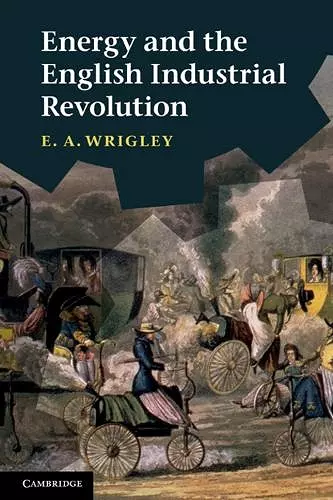Energy and the English Industrial Revolution
Format:Paperback
Publisher:Cambridge University Press
Published:19th Aug '10
Currently unavailable, and unfortunately no date known when it will be back
This paperback is available in another edition too:
- Hardback£51.00(9780521766937)

This book explains how new sources of energy increased productivity, thereby transforming industry and changing England permanently and fundamentally.
By accessing new sources of energy, the productivity of the average worker was increased and industry transformed. Anthony Wrigley explains how economic growth in England accelerated, providing a unique insight into understanding the industrial revolution. This book makes essential reading for students and scholars of British economic history.The industrial revolution transformed the productive power of societies. It did so by vastly increasing the individual productivity, thus delivering whole populations from poverty. In this new account by one of the world's acknowledged authorities the central issue is not simply how the revolution began but still more why it did not quickly end. The answer lay in the use of a new source of energy. Pre-industrial societies had access only to very limited energy supplies. As long as mechanical energy came principally from human or animal muscle and heat energy from wood, the maximum attainable level of productivity was bound to be low. Exploitation of a new source of energy in the form of coal provided an escape route from the constraints of an organic economy but also brought novel dangers. Since this happened first in England, its experience has a special fascination, though other countries rapidly followed suit.
'This book has changed the way I see the world. Smart, engaging and beautifully written, Wrigley's study of the Industrial Revolution casts a fascinating light on current energy questions. If you want to understand how our dependency on fossil fuels began and what we might do to escape it, you must read this book.' George Monbiot
'Here, Tony Wrigley develops the central themes that have characterized his distinctive contribution to the economic transformation of England. There is no better account of the role that the energy revolution played in the escape from the constraints of the Malthusian pre-industrial economy.' Nicholas Crafts, University of Warwick
'Tony Wrigley is one of the true Grand Men of the economic history profession. In this book he analyzes in depth the role of energy supplies in the emergence of modern economic growth and thus strikes a fascinating and most timely link between economic history and contemporary issues of energy and environment. Energy economics are of central importance to any study of economic change, especially when supported by the breadth of the learning underlying this book.' Joel Mokyr, Northwestern University
'Whether wind or solar power can ever provide the energy needed in an increasingly energy-conscious and insecure world is debatable but this excellent book provides a historical perspective that is either ignored or given little credence in contemporary debates of considerable subtlety and relevance. This is a book not to be ignored.' The Historical Association (history.org.uk)
'… an accessible and comprehensive guide to his interpretation of the industrial revolution. It offers at once a clear and compelling argument for the centrality of energy in the historical rise of industrial societies and an opportunity to meditate on the future sustainability of an economic order founded on fossil fuels.' Jan de Vries, Economic History Review
'… an often brilliant and always perceptive presentation of some of the key conclusions from every decade of his half-century of academic research to date.' Michael Anderson, Population Studies
ISBN: 9780521131858
Dimensions: 228mm x 153mm x 14mm
Weight: 470g
288 pages